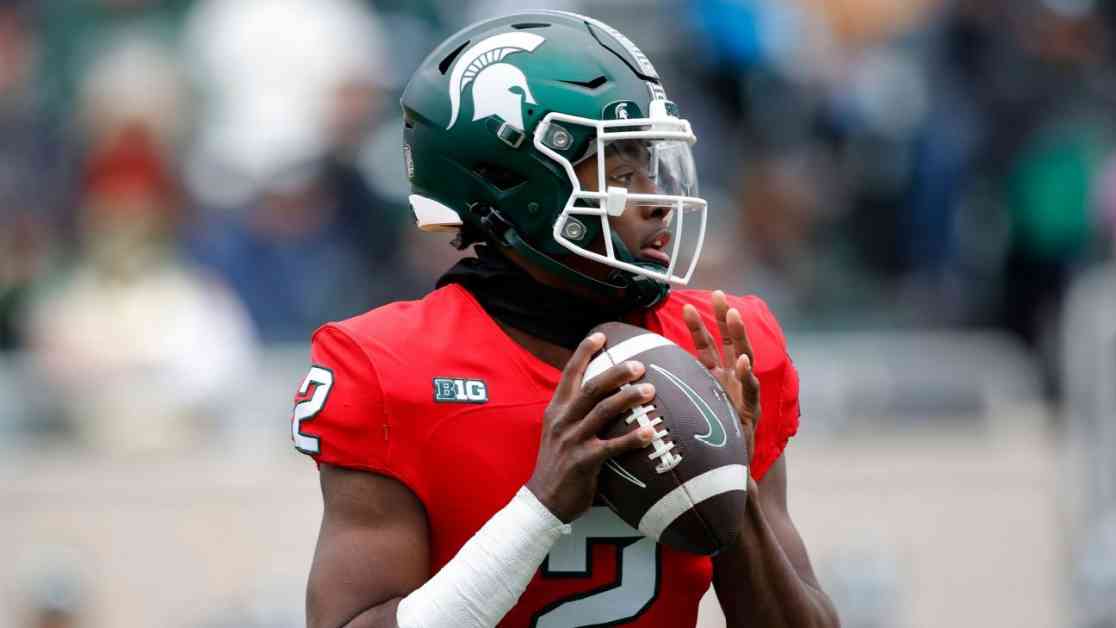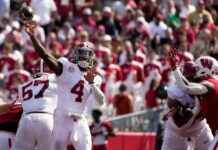Michigan State quarterback Aidan Chiles caused quite a stir in the sports betting world with his bold prediction ahead of the team’s opener against Florida Atlantic. Chiles confidently told reporters, “If you bet, take the over,” during a news conference, sparking a flurry of activity in the betting market. The impact of his statement was felt almost immediately, with a significant shift in betting patterns favoring the over on the game’s total.
Chiles’ remarks have led to a surge in betting activity, with 97% of the money wagered and 84% of the bets on the total at ESPN BET being on the over since his comments. Similarly, at BetMGM sportsbooks, there was a drastic change in betting behavior following Chiles’ statement. Initially, approximately 71% of the money wagered on the FAU-Michigan State total was on the under. However, after Chiles’ recommendation, that percentage flipped, with 64% of the money now on the over at BetMGM books.
As a result of Chiles’ bold prediction, the over/under number for the game has also seen an adjustment, moving up from 46.5 to 47.5 at various sportsbooks. This shift highlights the impact that a player’s statement can have on the betting market and how even a simple comment can influence wagering behavior significantly.
The response to Chiles’ remarks has raised questions about the responsibilities of student-athletes when it comes to sports betting and the potential risks involved. The NCAA, through its partnership with Epic Global Solutions, provides training to student-athletes on the dangers of sports betting and the importance of not sharing inside information that could be used for gambling purposes.
Saquandra Heath, the NCAA’s associate director of external communication, emphasized the need for student-athletes to exercise caution when discussing sensitive information, such as injury updates and game strategies, with the media, friends, or family. This information could potentially be exploited by individuals looking to gain an unfair advantage in the realm of sports betting.
Patrick Chester, a senior program facilitator for Epic, echoed Heath’s sentiments, stressing the importance of keeping information confidential within the team. Chester highlighted the potential consequences of sharing sensitive details with outside parties, including online abuse and threats, which could ultimately impact the integrity of the game and lead to unfair betting practices.
Chiles’ comments have also sparked a conversation about the role of schools and athletic departments in educating student-athletes on media relations and the potential implications of their statements on the betting market. While the NCAA encourages schools to provide media training for their athletes, the content and extent of this training remain at the discretion of the institutions.
In light of this incident, Michigan State has not provided any additional comments on Chiles’ remarks, signaling a cautious approach to handling the situation. The school’s response, or lack thereof, underscores the delicate balance that student-athletes must maintain when navigating the intersection of sports, media, and betting.
The Impact of Player Statements on Betting Behavior
Chiles’ bold prediction serves as a prime example of how player statements can influence betting behavior and market dynamics. In the world of sports betting, even a seemingly innocuous comment from a key player can have far-reaching implications, causing a shift in wagering patterns and altering the odds for a particular game.
The surge in betting activity following Chiles’ recommendation underscores the power that athletes hold in shaping the narrative around a game and driving interest from both fans and bettors. By expressing confidence in his team and suggesting a particular betting strategy, Chiles inadvertently sparked a frenzy of activity in the sports betting world, highlighting the interconnected nature of sports, media, and gambling.
The response to Chiles’ remarks also sheds light on the evolving landscape of sports betting and the increasing influence that athletes have on the market. As more states legalize sports betting and the industry continues to expand, the role of athletes in shaping betting behavior is likely to become more pronounced, necessitating a nuanced approach to media relations and public statements.
Educating Student-Athletes on Sports Betting
The NCAA’s partnership with Epic Global Solutions underscores the organization’s commitment to educating student-athletes on the potential risks and dangers associated with sports betting. Through training programs and outreach initiatives, the NCAA aims to equip athletes with the knowledge and tools they need to navigate the complex and sometimes murky world of sports gambling.
The training provided by Epic emphasizes the importance of maintaining confidentiality and integrity when it comes to sharing information that could impact the outcome of a game or be used for gambling purposes. By instilling a sense of responsibility and awareness in student-athletes, the NCAA and its partners seek to safeguard the integrity of collegiate sports and protect athletes from potential harm.
Moving forward, it will be crucial for schools and athletic departments to continue prioritizing media training for their athletes and reinforcing the principles of transparency, integrity, and ethical conduct. By fostering a culture of accountability and professionalism, institutions can help student-athletes navigate the complexities of media relations and sports betting with confidence and integrity.
The Role of Schools and Athletic Departments
In the wake of Chiles’ remarks, the role of schools and athletic departments in guiding and educating student-athletes has come under scrutiny. While the NCAA provides guidelines and resources for training athletes on sports betting policies, it ultimately falls to individual institutions to implement these programs effectively and ensure compliance among their student-athletes.
Michigan State’s response, or lack thereof, to Chiles’ comments underscores the need for schools to have clear protocols in place for handling situations that involve sensitive or potentially controversial statements from athletes. By establishing clear communication channels and guidelines for media interactions, schools can mitigate the risks associated with athlete statements that could impact the integrity of the game or the betting market.
As the landscape of sports betting continues to evolve and expand, it will be imperative for schools, athletic departments, and governing bodies to collaborate in educating and supporting student-athletes in navigating the complexities of media relations and sports gambling. By fostering a culture of transparency, accountability, and ethical conduct, institutions can empower athletes to make informed decisions and uphold the integrity of collegiate sports.












